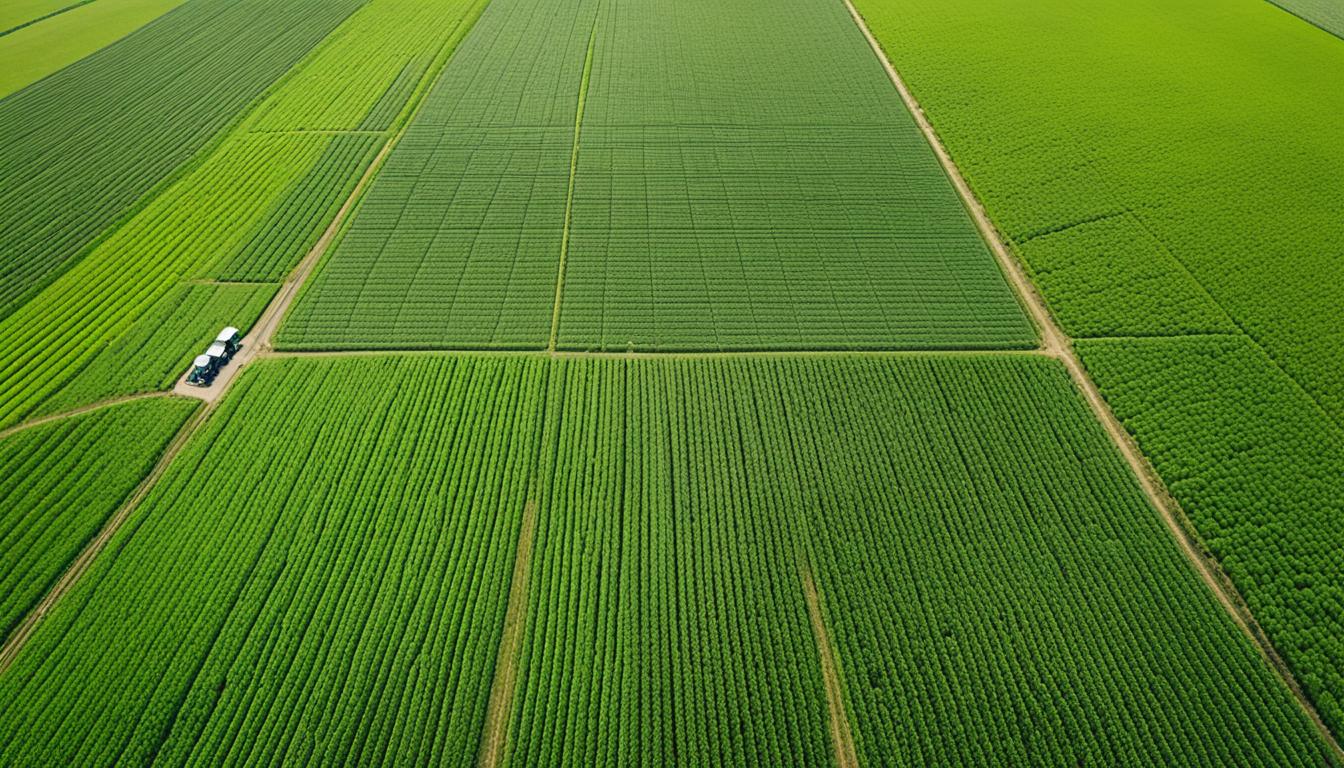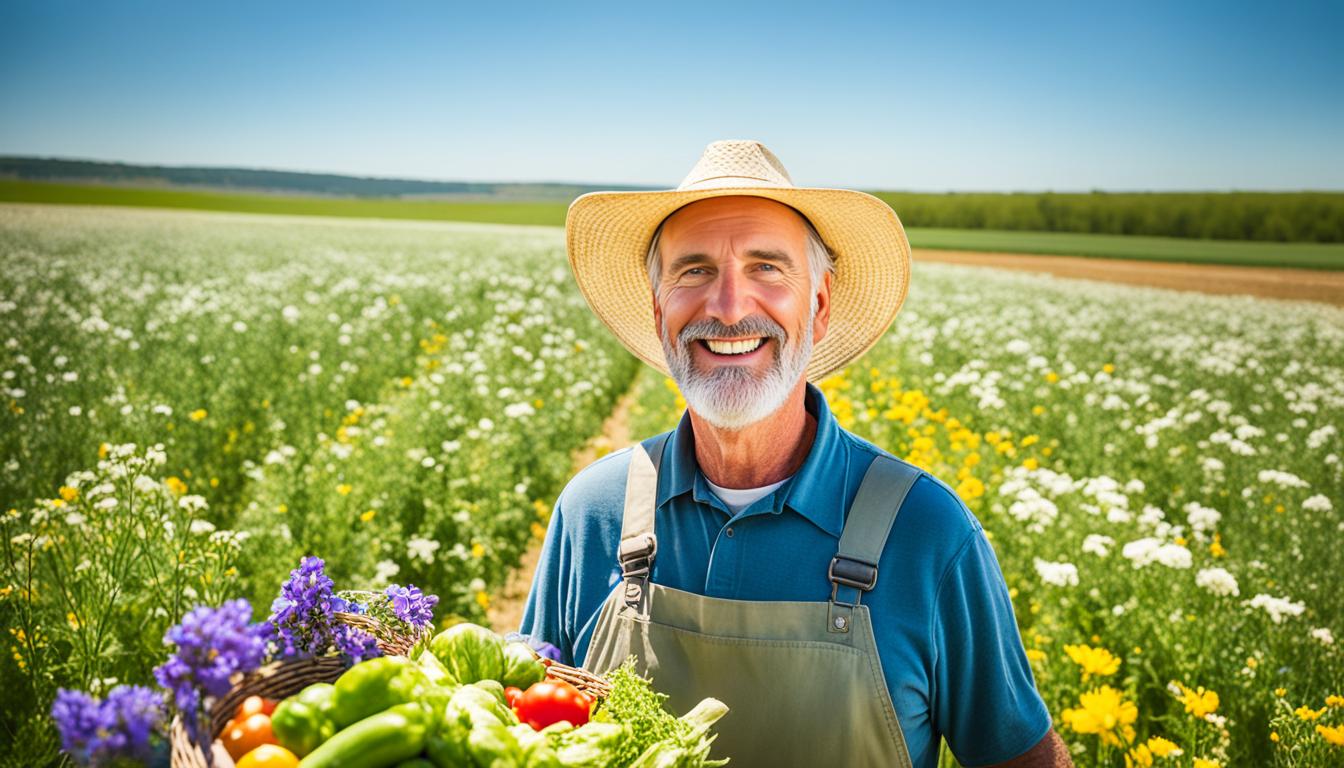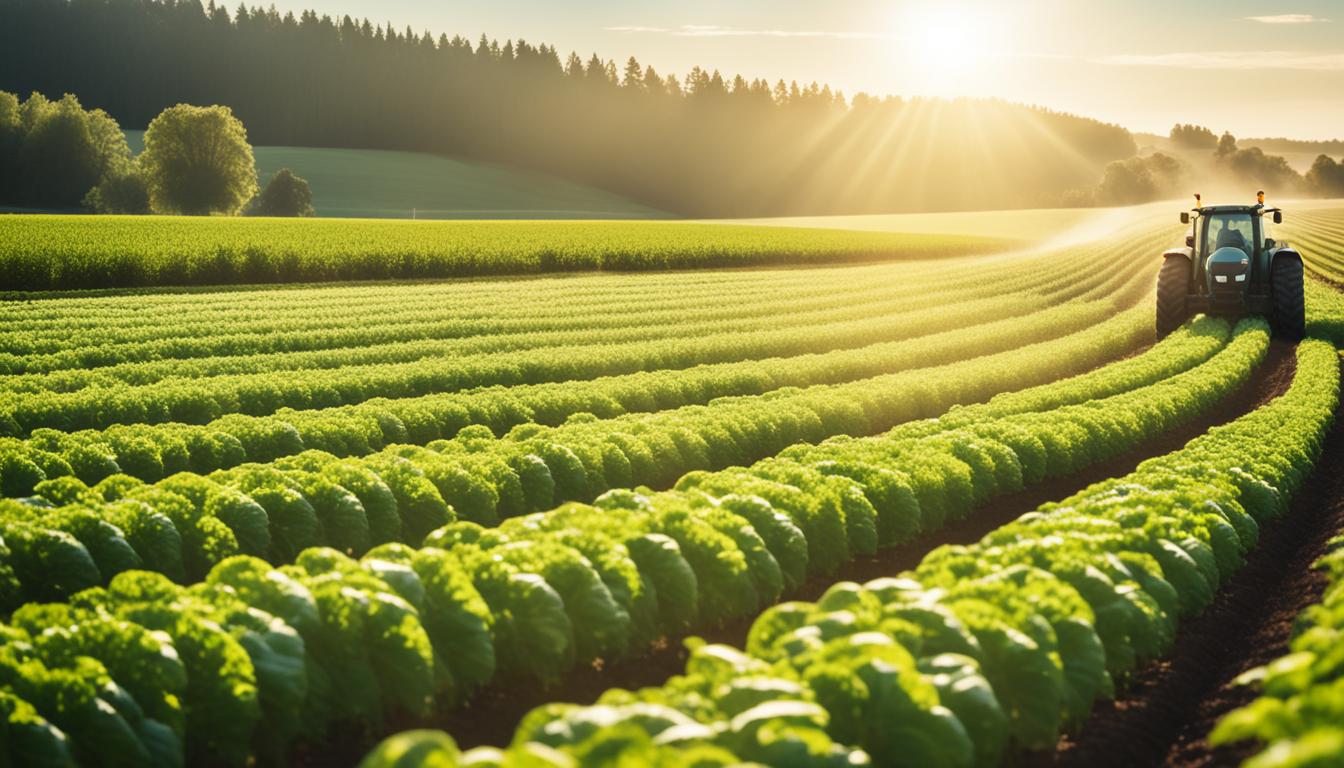Organic farming is a key solution for our eco-friendly needs. It offers a sustainable way forward. By using organic methods, you help protect our environment and support your community’s health. Organic farming improves soil health and supports many species, leading to a better future.
Organic farming values the natural world deeply. It avoids synthetic fertilizers and pesticides. This keeps the soil fertile and ecosystems healthy. It’s good for the planet and gives you fresh, chemical-free food.
Organic farming uses renewable resources like composting. This reduces waste and enriches the soil. It’s vital for sustainable growth. By doing this, you help protect our resources and fight climate change.
Organic farming also benefits communities and rural areas. It strengthens food security, creates jobs, and helps small farmers. This can revitalize rural areas, boosting the economy and social well-being.
Starting organic farming changes the world for the better. It focuses on protecting the environment, soil, and resources. You become a leader in building a resilient, fair future for everyone.
Understanding the Principles of Organic Farming
Organic farming is all about working with nature, not against it. It focuses on using natural ways to keep soil fertile and pests away. This approach helps farmers grow lots of food and keeps the environment healthy.
Eliminating Synthetic Chemicals
Organic farming says no to synthetic chemicals. Farmers use natural stuff instead of artificial fertilizers and pesticides. This is good for the soil, the land, and the food we eat.
Promoting Natural Soil Fertility
Healthy soil is key for organic farming. Farmers use things like compost and manure to make the soil rich and full of life. This way, plants grow strong and there’s more life in the soil.
| Organic Farming Principle | Description |
|---|---|
| Eliminating Synthetic Chemicals | Avoiding the use of artificial fertilizers and pesticides, opting for natural alternatives that are gentle on the environment. |
| Promoting Natural Soil Fertility | Utilizing organic matter, such as compost and manure, to enrich the soil and support the growth of beneficial microorganisms. |
| Biodiversity Conservation | Encouraging the presence of diverse plant and animal species to maintain a healthy, balanced ecosystem. |
“Organic farming is not just about what we put into the soil, but what we keep out of it.”
Environmental Conservation through Organic Practices
Organic farming is good for your crops and the planet. It avoids synthetic fertilizers and pesticides. This keeps our ecosystem in balance.
With organic farming practices, you help the environment and protect wildlife. It stops soil and water pollution. This means a cleaner, sustainable future for Earth.
Nurturing Biodiversity
Organic farming grows many crops and keeps natural habitats safe. This diversity supports a healthy ecosystem. It helps beneficial insects and pollinators, which are key for a balanced environment.
Soil Conservation
Organic farming skips synthetic chemicals, keeping soil fertile. This stops soil erosion and protects our land for the future.
| Organic Farming Practices | Environmental Benefits |
|---|---|
| Crop Rotation | Improved soil health and reduced pest infestations |
| Cover Cropping | Increased soil fertility and reduced erosion |
| Composting | Recycling of organic matter and reduced waste |
| Integrated Pest Management | Decreased reliance on synthetic pesticides |
By choosing organic farming practices, you help the environment. You contribute to a healthier, sustainable future for our planet.
Enhancing Soil Health and Biodiversity
Organic farming is a way to make soil healthier and support more life. By using sustainable methods like crop rotation and cover crops, farmers can make the soil better. They add important nutrients and keep the soil in good shape.
The Importance of Crop Rotation
Crop rotation is key in organic farming. By changing what crops grow in the same spot, farmers stop the soil from losing nutrients. It also stops pests and diseases from spreading. This keeps the soil healthy and increases the variety of life in the soil.
- Crop rotation makes soil fertile by bringing in plants that need different nutrients.
- Changing crops breaks the life cycles of pests and diseases, cutting down on the need for harmful chemicals.
- With more crops, there’s room for helpful insects and creatures. They help with pollination, fighting pests, and making nutrients available.
Encouraging Beneficial Insects and Organisms
Organic farming helps beneficial insects and other living things to live and thrive. By not using harmful pesticides, farmers create a healthy environment. This leads to a balanced and diverse ecosystem.
- Cover crops and keeping natural areas help insects like ladybugs and wasps to live.
- Organic farming brings earthworms and other underground creatures to the soil. They make the soil better and help with nutrients.
- Bees and butterflies do well in organic farms. They pollinate crops and help with biodiversity.
“Organic farming practices not only nourish the soil, but they also foster a diverse and thriving ecosystem that is essential for the long-term sustainability of our food production.”
Utilizing Renewable Resources Efficiently
Organic farming is more than just growing food without synthetic chemicals. It’s about making the most of renewable resources. Composting is a key practice in organic farming. It turns organic waste into a valuable soil amendment. This way, organic farmers can cut down on waste and keep their land fertile.
Composting and Recycling Organic Matter
Composting breaks down organic stuff like food scraps, yard trimmings, and manure into a soil additive full of nutrients. This process keeps waste out of landfills and helps the soil. Organic farmers use compost to make their soil better, hold more water, and support good microorganisms.
- Composting cuts down on organic waste going to landfills, where it would release methane, a strong greenhouse gas.
- Compost’s nutrients help feed the soil, cutting down on the need for synthetic fertilizers.
- Compost also helps soil hold water better, which means less need for water.
Organic farmers also recycle other organic stuff like crop leftovers and animal manure. This keeps the soil fertile and cuts down on waste. This way of using resources is a big part of sustainable organic farming.
“Organic farming is not just about growing food without synthetic chemicals – it’s also about maximizing the use of renewable resources.”
Eco-Friendly Farming Techniques for Sustainable Growth
Organic farmers are now using new ways to grow crops that are good for the planet and the farm. These eco-friendly farming techniques help the earth and make farming better for the future. They make farming more sustainable.
One important method is using cover crops. These crops make the soil healthier, stop weeds, and prevent soil loss. They also make the soil richer, so farmers use fewer chemicals.
Another method is called integrated pest management (IPM). It uses many ways to control pests and diseases. This way, farmers don’t use harmful chemicals as much. It makes farming better for the environment.
Adding animals to farms is also a good idea. Animals like chickens, sheep, or cattle help turn waste into food for the soil. This makes the soil richer and cuts down on the need for outside help.
| Eco-Friendly Farming Technique | Benefits |
|---|---|
| Cover Crops | Improved soil health, weed suppression, and natural fertility |
| Integrated Pest Management (IPM) | Reduced reliance on harmful pesticides and a more balanced ecosystem |
| Livestock Integration | Closed-loop system, recycling of waste products, and enhanced soil fertility |
By using eco-friendly farming techniques, organic farmers help the farm and the planet. They make sure the farm grows well for a long time. They also protect the environment and make food healthier.
How Organic Farming Promotes Sustainable Development
Organic farming is a key solution for sustainable development. It uses eco-friendly methods to improve the economy, society, and environment. This approach helps create a better future for everyone.
Organic farming focuses on protecting the environment. By avoiding synthetic fertilizers and pesticides, it keeps the soil, water, and air clean. This supports a healthy ecosystem and helps nature’s balance. It also protects biodiversity, ensuring nature’s long-term health.
Organic farming also helps rural communities. It gives farmers economic chances and helps the community. This leads to better lives for local people. Organic farming can make small farmers’ lives better by cutting costs and opening new markets.
| Sustainable Development Pillar | How Organic Farming Contributes |
|---|---|
| Environmental | Eliminates synthetic chemicals, promotes soil health, supports biodiversity |
| Social | Empowers rural communities, enhances quality of life |
| Economic | Provides economic opportunities, reduces input costs, access to premium markets |
Organic farming helps us work towards a sustainable future. It balances the needs of the planet, people, and economy. Organic farming is a way to make a better world for now and the future.
“Organic farming is not just about growing food – it’s about growing a healthier planet and a more sustainable future.”
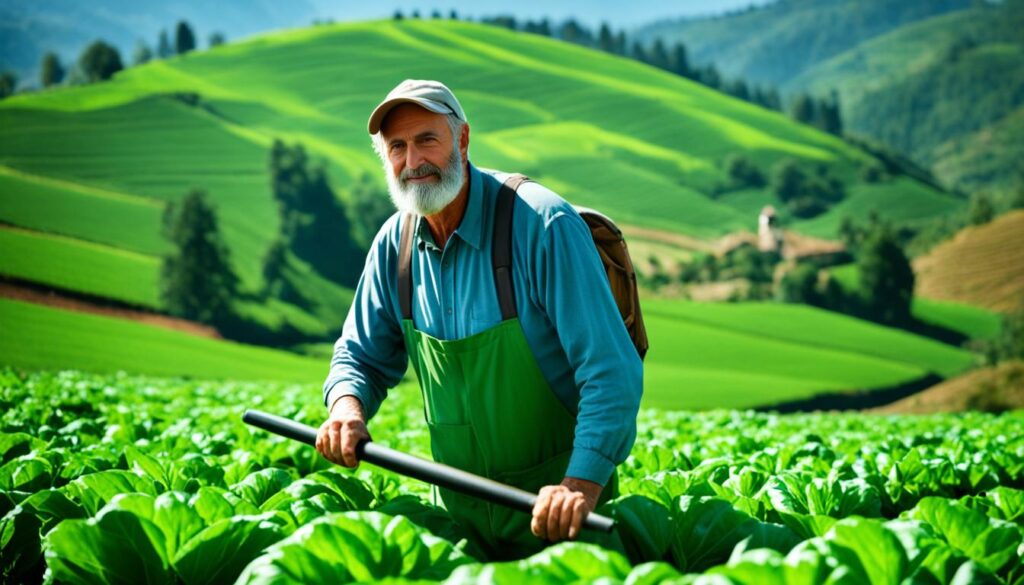
Mitigating Climate Change through Organic Farming
Organic farming is key in fighting climate change. It cuts down on greenhouse gases and helps store carbon. This makes it a big help in fighting global warming.
Reducing Carbon Footprint
Organic farming is great for reducing the carbon footprint of farming. It uses renewable energy and less synthetic stuff. This means less greenhouse gases and a greener way of making food.
Promoting Carbon Sequestration
Organic farming focuses on soil health and uses organic matter. This helps the soil take in and store more carbon. By doing things like crop rotation and using compost, farmers can increase carbon storage in soil. This helps fight the effects of climate change.
By choosing organic farming, we can greatly reduce our carbon footprint and increase carbon storage. This helps in the fight against climate change. It’s a step towards a more sustainable future.
Fostering Community Welfare and Rural Development
Organic farming is key to bettering community welfare and rural growth. It supports small farmers and local food systems. This leads to jobs, more food security, and better health for rural folks.
Organic farming helps local economies too. It creates strong farmers’ markets and CSA programs. This gives farmers steady work and puts fresh, healthy food in people’s hands.
Organic farming also looks after the land and resources. It focuses on soil health and using resources wisely. This makes the land and communities stronger for the future.
It keeps small farmers going and keeps rural areas lively. Plus, it uses old farming ways, keeping community culture alive. This deepens people’s bond with the earth and boosts community pride.
“Organic farming is not just about growing food – it’s about building resilient, thriving communities that are in harmony with the land.”
Choosing organic farming means a future that’s good for people and the planet. It’s a way to grow food that’s sustainable and fair for all. This approach helps rural areas grow in a way that benefits everyone.
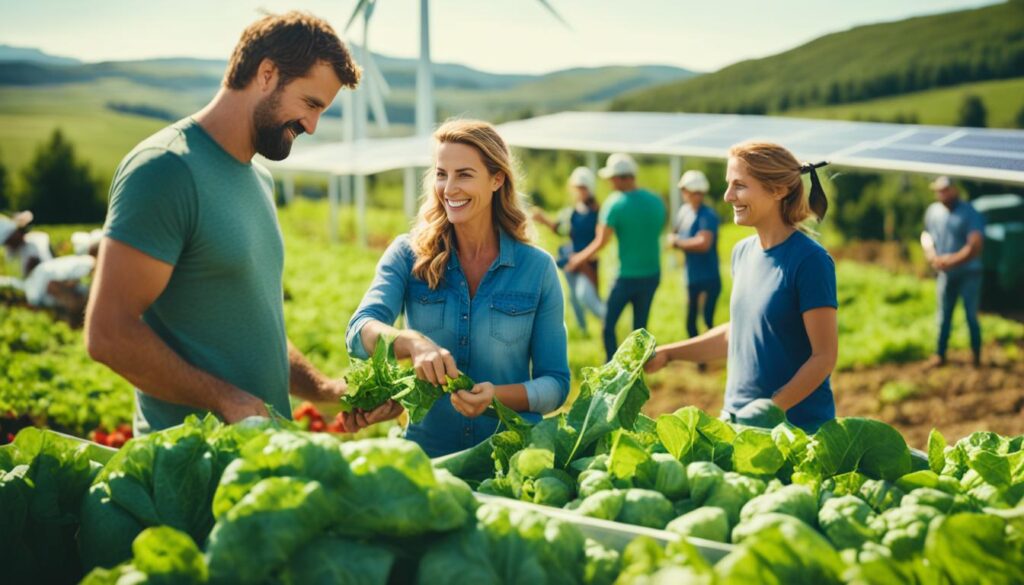
Economic Benefits of Organic Farming
Organic farming is good for the environment and also helps farmers and consumers financially. By using organic methods, farmers can meet the growing demand for organic food. They also save money by using sustainable farming.
Access to Premium Markets
Health-conscious people want organic food and are willing to pay more for it. This means organic farmers can make more money. As more people choose organic, farmers can find good deals with high-end stores and distributors.
Reduced Input Costs
Organic farming uses fewer synthetic fertilizers and pesticides. Instead, farmers use things like crop rotation and composting. This cuts down on costs, making farming more profitable.
Organic farmers can then sell their products for less but still make a good profit. This helps them stay competitive and financially stable.
| Economic Benefit | Description | Potential Impact |
|---|---|---|
| Access to Premium Markets | Organic products command higher prices in the market, allowing farmers to earn more revenue. | Increased profitability and financial security for organic farmers. |
| Reduced Input Costs | Organic farming relies on sustainable practices, reducing the need for expensive synthetic inputs. | Lower production costs and higher profit margins for organic farmers. |
“Organic farming has allowed us to not only protect the environment but also generate a steady income for our family. The premium prices we receive for our organic produce have been a game-changer for our business.”
– Jane Doe, Organic Farmer
Challenges and Opportunities in Organic Farming
The demand for organic products is rising, bringing both challenges and opportunities to organic farming. Organic farming is great for soil health and the environment. Yet, it has its own set of hurdles for farmers.
One big challenge is that organic farms might produce less than conventional farms. They use natural fertilizers and pest control, which can be less effective. This can lower crop production and affect a farm’s money-making ability.
Another challenge is the need for special knowledge in organic farming. Moving from traditional to organic farming requires knowing about sustainable soil care, crop rotation, and natural pest control. Farmers might need to spend more on training and resources to learn these skills.
Getting organic certification can also be costly. The process is time-consuming and expensive. This might stop some small-scale farmers from going organic.
But, these challenges also open doors for new ideas and growth. Improvements in organic farming research and new techniques can help increase yields and make organic farming better. Plus, more people wanting organic products means farmers can make good money by going organic.
Support from policies like subsidies, tax breaks, and research funding can also help organic farming. These policies can make organic farming easier for more farmers to do. By tackling these challenges and using the opportunities, organic farming can keep growing and help make our food system more sustainable.
| Challenges in Organic Farming | Opportunities in Organic Farming |
|---|---|
|
|
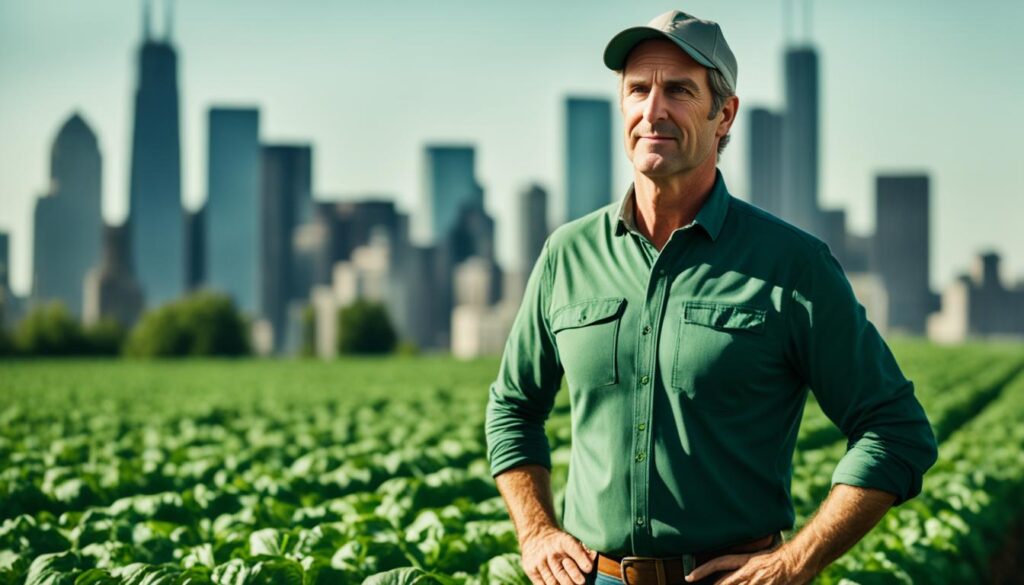
“The challenges in organic farming are not insurmountable. With the right support and continued innovation, the sector can overcome these obstacles and thrive in the years to come.”
Organic Certification: Ensuring Quality and Integrity
Organic certification is more than just a label. It shows the quality and integrity of organic products. Organic farmers and producers meet strict standards. This gives consumers peace of mind that their products are truly organic and support sustainable farming.
The process of getting organic certification is detailed. It checks farming practices, production methods, and how products move from farm to table. This makes sure organic products don’t have synthetic fertilizers or pesticides. It also helps with biodiversity, soil health, and using resources wisely.
| Key Aspects of Organic Certification | Benefits for Consumers |
|---|---|
|
|
When you pick organic certified products, you’re supporting a better food system. This is good for your health and the planet. It helps keep our natural resources safe for the future.
“Organic certification is the foundation of trust between producers and consumers, ensuring that the products we purchase are truly organic and align with our values.”
The Future of Organic Farming: Sustainable Solutions
The demand for organic products is rising, making the future of organic farming look bright. With ongoing research, policy support, and more people learning about it, organic farming can tackle today’s big challenges. These challenges include environmental, social, and economic issues in farming.
More people want food that is good for the planet and their health. They’re learning about the benefits of organic farming. These benefits include less use of harmful chemicals, more biodiversity, and a focus on sustainability.
New tech in organic farming, like precision farming and renewable energy, will shape its future. These innovations make farming better by using resources wisely, boosting crop production, and reducing harm to the environment.
Government support is key to growing the organic farming sector. By investing in research, education, and training for farmers, and by creating supportive policies, we can encourage more organic farming.
As we look ahead, organic farming will bring solutions to today’s farming challenges. It will help protect the environment and improve the health of communities. By following organic farming’s principles, we can create a better, more sustainable food system for everyone.
| Trends Shaping the Future of Organic Farming | Potential Impact |
|---|---|
| Increasing consumer demand for organic products | Drives market growth and incentivizes farmers to transition to organic practices |
| Advancements in organic farming technologies | Improves efficiency, productivity, and environmental sustainability |
| Favorable government policies and incentives | Supports the expansion of the organic farming sector and encourages widespread adoption |
“The future of organic farming lies in its ability to provide sustainable solutions that address the pressing environmental, social, and economic challenges we face today.”
Conclusion
Organic farming has shown its power in making our world better. It uses eco-friendly ways to improve soil health, protect nature, and help rural areas. This approach is getting more popular and could solve big environmental and social problems.
You’ve learned how organic farming helps our planet. It stops using harmful chemicals, which keeps our ecosystems balanced. It also helps natural soil fertility and supports good insects and organisms. This shows how important organic farming is for our environment’s health.
The future looks bright for organic farming. It helps fight climate change by reducing carbon emissions and storing more carbon. It also helps farmers and rural communities by offering better markets and saving money. Even with challenges ahead, organic farming has many chances for growth and new ideas.
